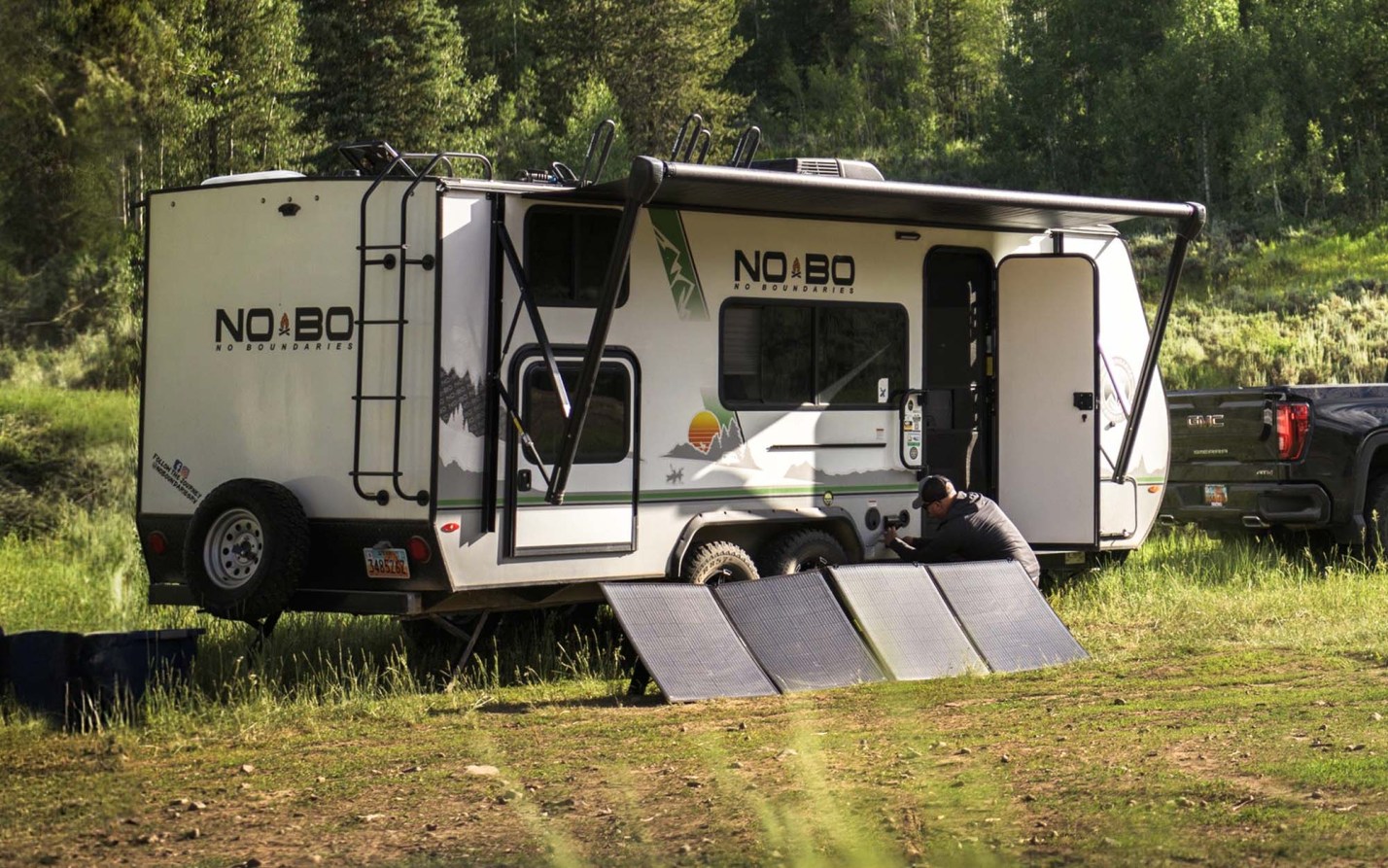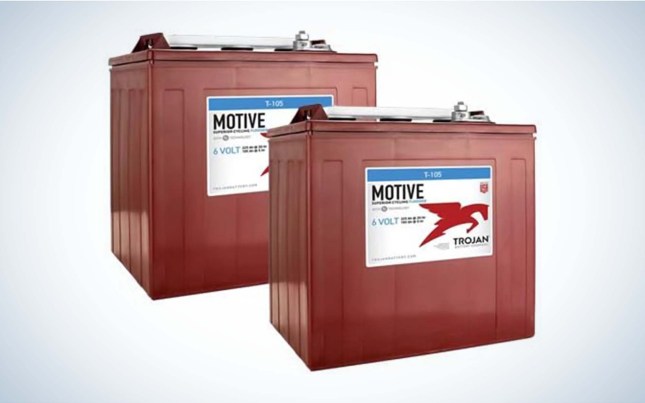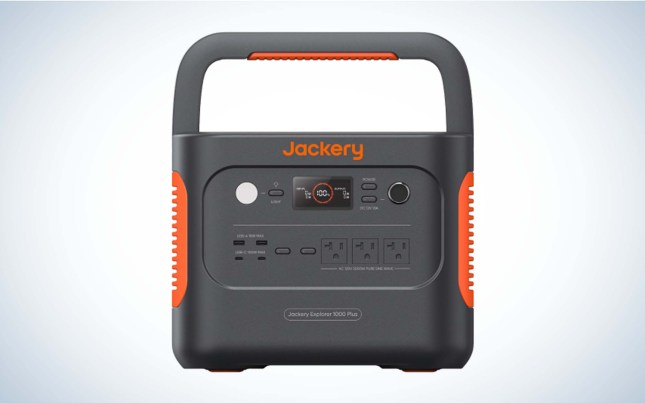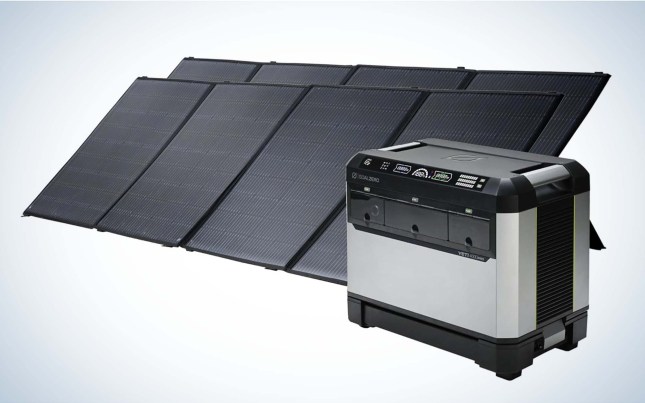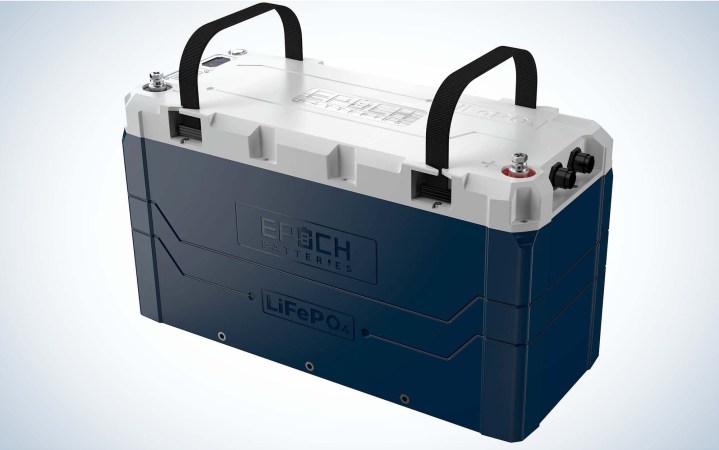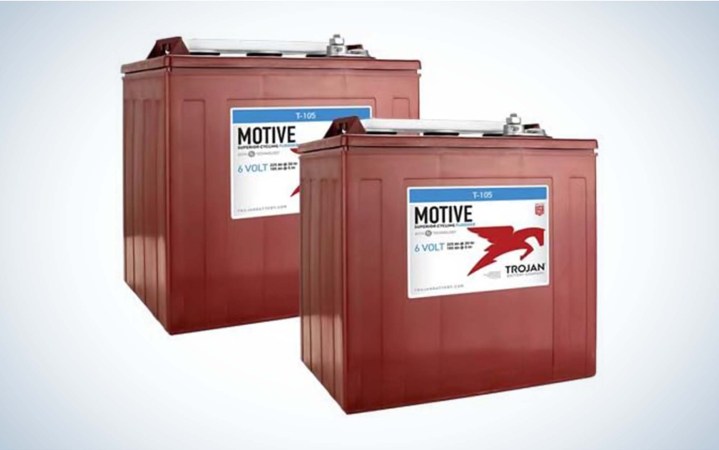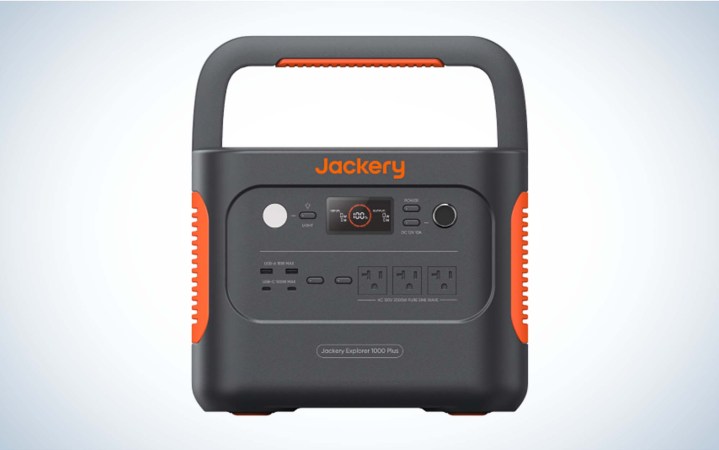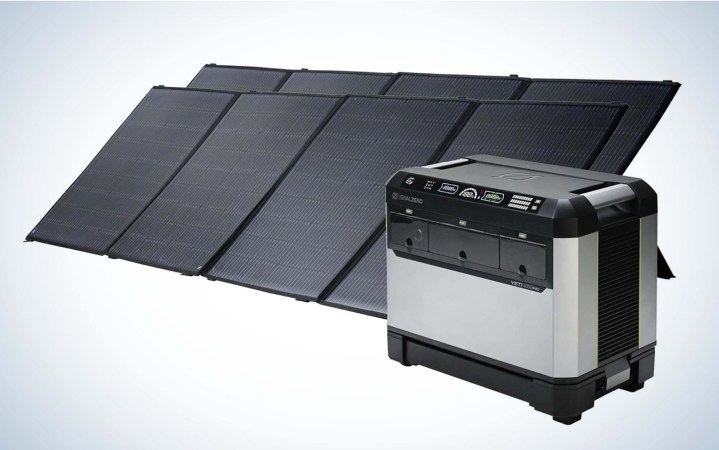We may earn revenue from the products available on this page and participate in affiliate programs. Learn More ›
Your RV is a rolling vacation house, a home away from home. For some, it’s actually a primary residence. A van, RV, or camper trailer might be your ticket to freedom, but it also requires thoughtful planning and maintenance. Electricity means the difference between an RV vacation and living out of a cold, dark bus, so equipping your camper with the best RV battery is key.
You need a battery to start your engine, but that’s not the one we’re talking about. The RV batteries most people have questions about are house batteries — the ones that power your RV’s air conditioner, appliances, and lighting.
I researched some of the best RV batteries out there, ranging from deep-cycle batteries that you can install and use for years at a time to solar generators that can power an entire campsite outside of your RV.
- Best RV House Battery: Epoch Batteries 12V 460Ah LiFePo4
- Best Value RV House Battery: Trojan T-105
- Best Value Power Station: Jackery Explorer 1000 Plus
- Best Solar Generator: Goal Zero Yeti PRO 4000 and Nomad 400
How I Chose The Best RV Batteries
Even though we all have experience with a wide variety of batteries, RV batteries have unique needs and considerations that don’t apply to the starter batteries in our cars or the rechargeable batteries in our portable power banks. RV batteries might sit idle for months at a time, endure huge temperature swings, and be called on to power anything from a TV to multiple air conditioners.
I consulted RV forums, battery experts, and authoritative sources like KOA to get as much reliable information as possible. I researched lead-acid, absorbed glass mat (AGM), and lithium batteries. I considered the fact that some campers might not have power in their van or trailer, in which case they need a standalone power station.
The end result is a quick list of four RV batteries that are perfect for dry camping or boondocking (camping without access to utilities). Whether you want the best technology available or a cost-effective way to keep your RV up and running, we’ve got you covered.
Best RV Batteries: Reviews and Recommendations
Best RV House Battery: Epoch Batteries 12V 460Ah LiFePo4
Key Features
- 12-volt
- Lithium iron phosphate (LiFePO4)
- Group 8D size
Pros
- Smart battery management system and Bluetooth control
- Self-heating
- IP67 waterproof
Cons
- Expensive
- Heavy
RV battery technology hasn’t changed much over the years, but Epoch Batteries has a game-changer in this one. It’s brains and brawn in one package, and it’s worth every penny.
The 460 amp-hour (roughly 6,000 watt-hours) battery is powerful and resilient, but it’s also intelligent. An internal heater keeps the lithium iron phosphate cell at a healthy temperature. You can check the battery’s charge with a gauge that you can mount where it’s easy to see in your RV, or you can check on your phone with an app. When you put your RV in storage, you can disconnect the battery with a power switch rather than disconnecting the negative terminal.
With this much power, you’ll have all the electricity you need for a class B van or class C RV, and you’ll be well on your way to equipping a class A RV or fifth-wheel trailer with a two- or three-battery rack.
Because of this battery’s size, it might not fit in smaller RV battery compartments. It’s more stable than conventional batteries, though, so you should be able to create a mounting solution that works – assuming you can afford the $2,000 price tag.
Best Value RV House Battery: Trojan T-105
Key Features
- 6-volt
- Lead-acid
- Sold in pairs to replace 12-volt batteries
Pros
- Cost-effective for increasing capacity
- Less expensive than AGM or lithium batteries
- Robust and long-lasting
Cons
- Requires regular maintenance
- Cannot ship via some common carriers
One of the most affordable ways to power your RV is to use 6-volt deep-cycle batteries. These were originally developed for golf carts, but their durability in terms of power delivery and recharge cycles drew the attention of RV campers and boaters who wanted a cost-effective option for dry camping or boondocking. These Trojan T-105 batteries are commonly cited on RV forums as some of the best.
Using 6-volt batteries instead of 12-volt batteries is a cost-saving technique recommended by KOA. This approach yields a similar voltage to a single 12-volt battery but it increases capacity. In other words, you won’t be able to power more appliances, but you will be able to power the same appliances for a longer period of time (and you’ll spend less money to do it).
Like all lead-acid batteries, this one requires more knowledge and maintenance than AGM or lithium batteries. Read up on proper lead-acid battery upkeep to extend your battery’s life and avoid problems like leakage, off-gassing, and excessive sulfation. For best results, protect these batteries by never discharging them below 50%.
Best Value Power Station: Jackery Explorer 1000 Plus
Key Features
- 1,264 watt-hours
- Charges from a wall outlet in 1.7 hours or a car outlet in 7 hours
- AC and DC output ports
Pros
- Sized like a lunchbox and only weighs 22 pounds
- Very durable
- Can be charged while in use
Cons
- Limited power capacity
- Expensive
For smaller camper trailers and vans that don’t have an integrated power supply, the Jackery Explorer 1000 Plus is a great way to store power with no installation required. It’s been the darling of camping and overlanding groups for years, and there’s no better value if you ask me.
This power station is a new upgrade from the outgoing Explorer 1000. It gets a bump in power from 1,002 to 1,264 watt-hours, and cuts several hours off charge times, whether you’re using a wall outlet, your car, or Jackery solar panels. Output options include three 120-volt AC outlets, one 12-volt car outlet, two USB-A ports, and two USB-C ports.
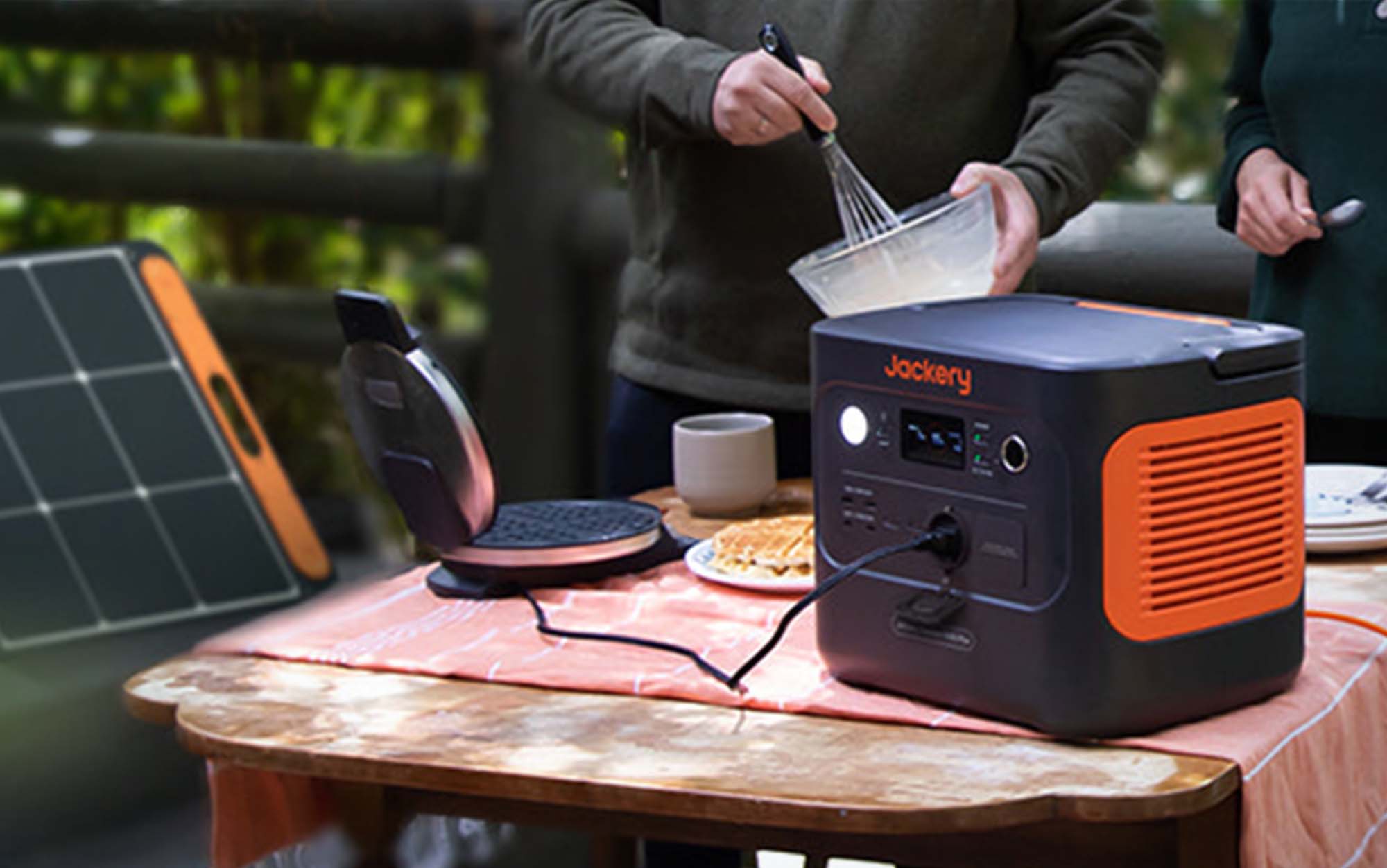
Jackery
According to Jackery, the Explorer Plus can run a 60-watt refrigerator for 45 hours, and charge a drone 29 times. You can also use the run-time calculator on Jackery’s website to find out how long it will power specific devices you already own. If you need more power down the road, you can pair the Explorer 1000 Plus with accessory batteries to increase capacity.
Appliances with heavy power demand, like air conditioners and microwaves, will only last an hour or so on the Explorer Plus, so it’s better suited to small electronics than powering your entire van or camper.
Best Solar Generator: Goal Zero Yeti PRO 4000 and Nomad 400
Key Features
- 3,994 watt-hours
- Charges from two Nomad 400 solar panels in less than 12 hours
- AC and DC output ports
Pros
- Powerful enough to run almost any home appliance
- Daisy-chain multiple solar panels to reduce charging times
- Add extra Goal Zero batteries to increase power reserves
Cons
- Solar charging is less reliable than charging from the grid
- Expensive and heavy
Goal Zero solar generators are expensive, but it’s hard to argue that they’re not worth it. The Yeti PRO 4000 has plenty of power for most RVs, and Goal Zero’s Nomad series of solar panels can keep it charged with no need to tap into the grid or run your RV’s engine.
The lithium-ion battery in this 3,994-watt-hour power station is powerful enough to run most home appliances, with the exception of home HVAC systems which draw considerably more power than RV air conditioning units. Output options include AC and DC ports that let you power everything from your cell phone to large appliances. You can monitor charge status, power usage, and power-saving tips with the Goal Zero Yeti Power app or check the station’s color display to keep an eye on its battery level.
Goal Zero recommends the Yeti PRO 4000 as a home backup solar generator, which makes it more than capable of handling most dry camping needs. Refrigerated coolers, pellet smokers, and small air conditioners will be no problem for this setup.
This kit comes with two 400-watt Nomad solar panels. In ideal lighting, this can charge the Yeti 3000X completely in just a few hours. To reduce charge time, consider adding more Boulder solar panels or charge the power station from a wall outlet when you have the option. Like Jackery, Goal Zero allows you to link auxiliary batteries with this power station to increase its power capacity.
Like all Goal Zero products, this solar generator kit is expensive. It’s a great middleweight option that bridges the gap between a compact power station and a row of deep-cycle batteries, though, and it can be a nice backup for your home during weather emergencies.
Read Next: Best Solar Generators
How to Choose the Best RV Battery
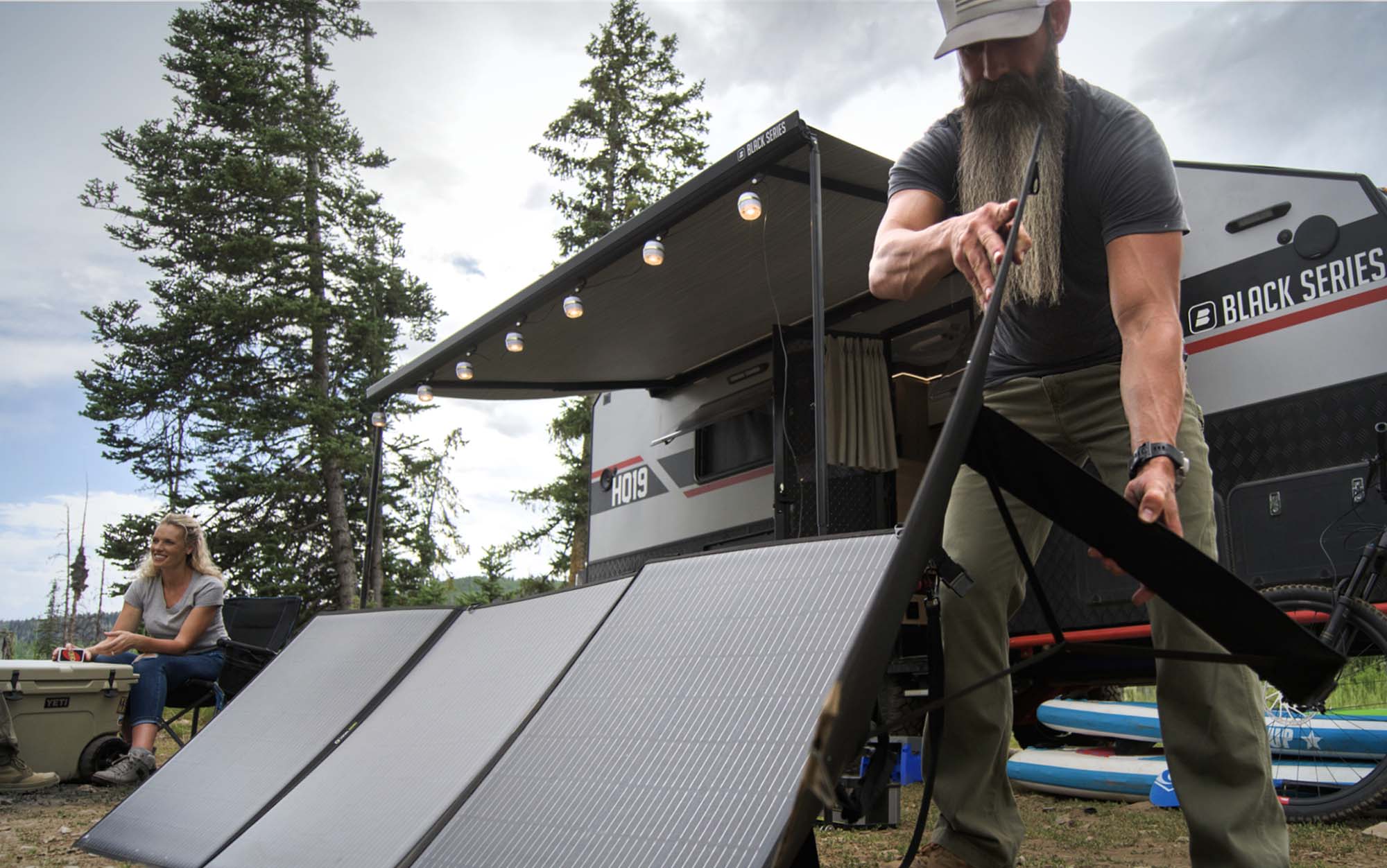
Goal Zero
Your first step in picking an RV battery should be whether you need a conventional house battery or a standalone power station. House batteries look like the battery in your car, and get installed into a dedicated compartment in your vehicle. Standalone power stations can be used to power your RV or other electronics, and they can be charged from a wall outlet, your vehicle, or solar panels.
How To Determine How Much Power You Need
To find out how much power your RV needs, you’ll need to know how much electricity each appliance or device uses and how much time it will spend drawing power. You’ll have to tally up these numbers, which you can find on the back of each appliance or device, and multiply that figure by the number of hours you’ll be using it.
This can get complicated as you factor in things like air conditioners, refrigerators, and personal electronics, but there are some general guidelines. Cummins recommends 2,000 to 3,600 watts for a class B van, 2,800 to 4,000 watts for a class C RV, 5,500 to 7,000 watts for a fifth-wheel trailer camper, and anywhere from 5,500 to 12,500 watts for a class A RV depending on whether you have one or two air conditioning units.
Conventional Batteries vs. Power Stations
Almost all RVs require a conventional house battery. Vans and small trailer campers will generally need a standalone power station.
If you have an RV with house batteries, you can still take advantage of a power station to run external electronics around the campsite without dipping into your main power reserve. These work great for pellet smokers, portable refrigerators, and personal electronics.
FAQs
The battery under the hood of your RV functions just like the one in your car. This is your chassis battery or starting battery. It supplies the engine’s starter with high power output, but only for a few seconds. After that, the alternator acts as a charger while the battery runs your RV’s driving electronics.
The electricity in the living area of your RV comes from a house battery (or, more likely, multiple house batteries). These look like chassis batteries, but they are designed to provide power over hours, not seconds, and endure much deeper discharges of power between chargings.
When you’re buying batteries for your RV, make sure you get the right type for each application. KOA has a nice explanation if you want to get into the specifics of each. If you’re not sure how to wire multiple batteries to get the results you want, check out this guide that was originally published in Trailer Life Magazine.
In most cases, your RV’s alternator will charge the chassis battery and the house batteries while the engine is running. This isn’t the most efficient method, though. Faster ways to charge your RV house batteries include shore power (an outlet attached to the power grid), a generator, and solar panels.
How long an RV battery lasts depends on how it’s used. Completely depleting it, exposing it to extreme temperatures (hot or cold), and the type of water used in a lead-acid battery will all reduce its service life. If treated well, most RV batteries should last about six years, according to KOA.
Final Thoughts on the Best RV Batteries
Shopping for an RV battery isn’t the most exciting part of owning a home on wheels, but it is necessary. Spending your money wisely upfront can save you from unexpected costs and headaches in the long run because quality batteries are more reliable and longer lasting than cheap alternatives.
The Epoch Batteries 12V 460Ah LiFePo4 is a great option if you need lots of power and have room in your budget. If you need something more affordable, pick up a few Trojan T-105 batteries. Add power to your campsite, van, or trailer as needed with a power station or solar generator from Goal Zero or Jackery.
